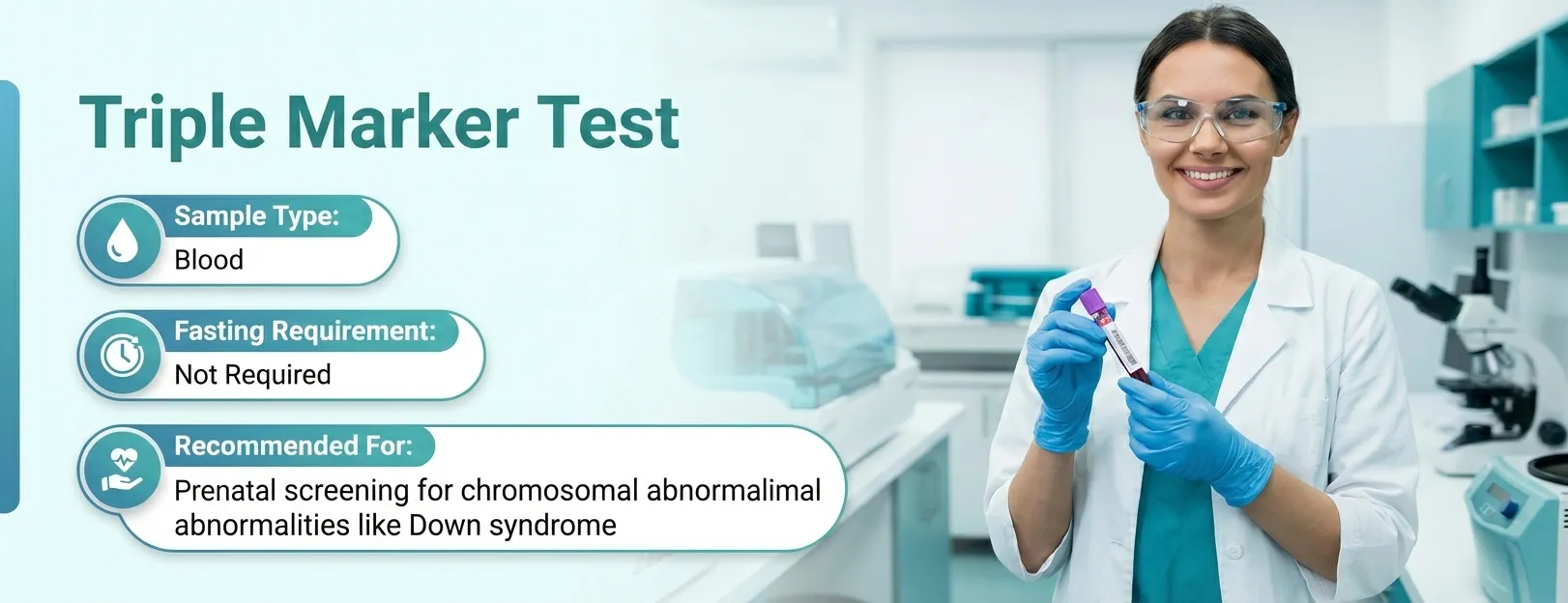1+ orders placed in your location
100% NABL & ISO Certified Lab • 100% Accurate Reports
Triple Marker Test
Triple Marker Screening, Triple Test, Multiple Markers Screening, AFP Plus Test
- SummaryThe Triple Marker Test is a prenatal screening test that measures levels of three substances, AFP, HCG and estriol, in a pregnant woman’s blood. It helps assess the risk of chromosomal abnormalities and certain birth defects in the developing baby. Recommended between 15–20 weeks of pregnancy, this test requires a blood sample, does not require fasting, and is advised only for women of reproductive age.Read more
- Reports WithinN/AView Sample Report100% NABL & ISO Certified Labs
- SampleBlood
- AgeWomen of reproductive age
- GenderFemales
- FastingNot Required
PharmEasy Promises
Know More About The Test
A quick info on Triple Marker Test
Overview
The Triple Marker Test is one of the tests performed during the prenatal screening period. This is a period in your pregnancy when the doctor asks you to undergo several tests to determine the condition of your pregnancy.
This particular test helps detect any possible pregnancy complications levels of the three hormones. These three hormones that are tested during the Triple Marker Test are:
- AFP or Alpha-fetoprotein (AFP) - The foetus produces this hormone. It is essential for this hormone to be present in normal quantities.
- Free Beta hCG or Beta Human Chorionic Gonadotropin (HCG) - This hormone is produced by the mother’s placenta and nourishes the foetus. Its too high or too low levels can cause problems.
- Estriol - This hormone is a kind of estrogen produced by both the mother and the child. In abnormal levels, it can lead to health issues like Down Syndrome.
Your healthcare practitioner can interpret the Triple Marker Test results to identify the possibility of developing any pregnancy-related health concerns. Some of these include Down Syndrome, Edwards Syndrome, and Ectopic Pregnancy.
The Triple Marker Test is recommended for pregnant mothers during their 15 weeks and 20 weeks of pregnancy.
Healthcare professionals recommend this test to prevent any pregnancy complications and ensure the well-being of mother and baby.
Risk Assessment
Down Syndrome, Neural Tube Defects, Multiple Pregnancies, Edwards Syndrome, and Ectopic Pregnancy
What does this test detect?
The Triple Marker Test means the pregnant woman’s body is being checked for the levels of three important hormones. These hormones can point out the risk of developing any complications at the time of birth or further in pregnancy.
Indications for Triple Marker Test
Some of the medical situations in which doctors make use of the Triple Marker Test are:
- Down Syndrome: Down Syndrome is a manifestation of abnormal chromosomes in the fetus’ body. Together, the levels of AFP, Free Beta hCG, and Estriol can help determine the possibility of the fetus having the disorder.
- Edwards Syndrome: Edwards Syndrome affects the proper development of the child’s brain and other organs that can show up even after two years of life. This syndrome can even prove to be life-threatening in some cases.
- Ectopic Pregnancy: Ectopic Pregnancy results from the fertilized egg attaching itself to a place that is outside the uterus or womb. This condition mostly leads to a miscarriage because the baby cannot get the right environment (as inside the urethra) to grow properly. The levels of Free Beta hCG hormone can be beneficial in the detection of ectopic pregnancies.
The test is prescribed to pregnant women to assess their state of pregnancy and the unborn child’s well-being.
How frequently should you take this test?
The Triple Marker Test is only suggested to pregnant women as a part of their prenatal screening. However, sometimes your doctor may also suggest you undergo the Triple Marker Test when you are not pregnant to determine any possible risks later in your pregnancy.
Test Preparation
Before the Test
Usually a doctor doesn't instruct specific preparation for a Triple Marker test. However, if this test is paired with another, you might be advised to avoid certain foods. To ensure the most precise outcomes, consult with your healthcare provider before any test.
During the Test
Blood will be drawn from a vein in your arm to be collected as the sample. Your experience will likely resemble the following:
- The site where the needle will be inserted is disinfected with an antiseptic solution.
- A tourniquet is wrapped around your arm to enlarge the veins.
- A fresh needle is inserted into the vein to collect the blood. This process could take a few seconds, during which you might experience a minor discomfort from the needle.
- Your blood sample will be placed in a small container or tube labelled with your test information.
After the Test
After the blood is collected:
- A bandage is applied to the site where the needle was inserted to stop any bleeding.
- You might feel a bit sore or lightheaded, nothing to be concerned about. You may be asked to rest for a few minutes.
- Reach out to your doctor if you notice any bleeding, discomfort, or rashes at the site of the puncture.
Parameters
The results of the Triple Marker Test can be affected by several parameters, including -
- Weight of the mother
- Age of the pregnant woman (above 35 years)
- Ethnicity of the mother
- Any pre-existing medical conditions like diabetes
- Mother taking regular medications like insulin
- Exposure to high levels of radiation
- Family history of having any genetic disorders
All these factors are capable of causing the Triple Marker Test results to deviate from their normal levels. They can be better understood only with the expertise of your healthcare practitioner.
Ranges
Although it is often hard to develop a normal range of references for Indian mothers, here is a table that you can refer to for interpreting your Triple Marker Test results:
Number of Weeks (Pregnancy) | Level of AFP | Level of hCG | Level of Estriol |
15 | 32.01 ng/mL | 32200 mIU/mL | 0.55 ng/mL |
16 | 37.67 ng/mL | 25690 mIU/mL | 0.76 ng/mL |
17 | 44.33 ng/mL | 20490 mIU/mL | 1.00 ng/mL |
18 | 52.16 ng/mL | 16340 mIU/mL | 1.25 ng/mL |
19 | 61.38 ng/mL | 13040 mIU/mL | 1.50 ng/mL |
20 | 72.33 ng/mL | 10400 mIU/mL | 1.76 ng/mL |
The normal values and reference ranges of the test may vary from lab to lab. Please refer to the ranges mentioned in the report and consult a doctor to understand the interpretation of lab reports.
Test Result Interpretation
Any deviations from the normal range of reference can indicate the possibility of an abnormal pregnancy, multiple pregnancies, neural tube defects in the fetus, or ectopic pregnancy. However, depending on a few factors (as mentioned in test parameters), your results may not be “normal”. But your pregnancy may still not be abnormal. You should always take your healthcare practitioner’s advice to interpret the Triple Marker Test results as per your body, genes, health conditions, etc.
Price/Cost
The pricing for a Triple Marker test can vary based on the city and the laboratory. Typically, the cost of a Triple Marker test ranges from INR 899 to INR 2749. Here is a detailed breakdown of the average charges for a Triple Marker test in various major cities across India:
City | Min Price | Average Price | Max Price |
Triple Marker Test Price in Bengaluru | 899 | 1824 | 2749 |
Triple Marker Test Price in Chennai | 899 | 1824 | 2749 |
Triple Marker Test Price in Delhi | 899 | 1824 | 2749 |
Triple Marker Test Price in Hyderabad | 899 | 1824 | 2749 |
Triple Marker Test Price in Kolkata | 899 | 1824 | 2749 |
Triple Marker Test Price in Lucknow | 899 | 1824 | 2749 |
Triple Marker Test Price in Mumbai | 899 | 1824 | 2749 |
Triple Marker Test Price in Nagpur | 899 | 1824 | 2749 |
Triple Marker Test Price in Patna | 899 | 1824 | 2749 |
Triple Marker Test Price in Pune | 899 | 1824 | 2749 |
Risks and Limitations
The Triple Marker Test, a commonly performed blood test, carries very few risks of complications. Consult your physician if you experience:
- Persistent bleeding at the puncture site
- Redness, swelling, or pain at the needle insertion site.
Limitations of the test
- Potential inaccuracies due to equipment malfunction or human error
- Misinterpretation of markers which may lead to an inaccurate reading and report.
Was This Test Information Helpful?
Please rate your experience
References
People Also Ask
Is the triple marker test compulsory?
When is the triple marker done?
Why is the Triple test done during pregnancy?
What is the normal range of the triple marker test?
What happens if the triple marker test is positive?
Have any doubts? Ask us.
Ask us anything about the Triple Marker Test to understand it better
We provide trusted, expert-curated health content to support better awareness,prevention, and care.
Backed by experienced doctors, medical experts, and strict editorial standards.


